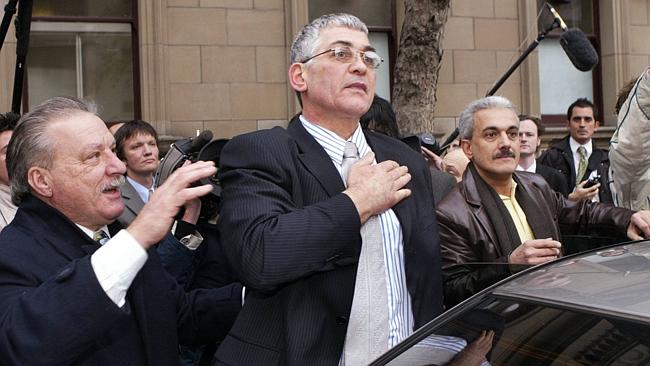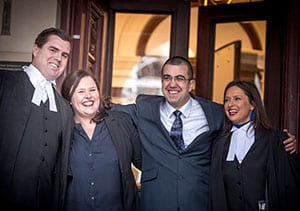Murder Lawyers
This is one very professional and capable firm. I dealt with Ruth Parker and she was the ultimate professional. Her knowledge of how the court system works is amazing.
She predicted the outcome right from the start and how it was going to pan out and she was 100% spot on.I cannot recommend them highly enough.
December 2022
When charged with a Homicide, you need the best murder lawyers in your corner
Galbally Parker Lawyers operates one of the most successful private homicide defence practices in Victoria. Whilst the majority of homicide matters are dealt with through legal aid, Galbally Parker offers a boutique private service to those defending charges of murder, manslaughter and culpable driving, with access to the best Barristers and experts to assist in our homicide defence of those denying charges arising from the death of another person. Any homicide matter attracts a significant term of imprisonment. That is why you need the best murder lawyers in your corner – Galbally Parker Lawyeres
Experienced, Melbourne-based murder lawyers
For example, in 2014, we defended Phillip Bracken, who was the first person in Victoria to be acquitted of murder on the basis of Family Violence Self Defence. Our team of murder lawyers regularly defend individuals charged with homicide offences and are proud of our successful record of our homicide defences, including acquittals, as well as our record for appearing in Plea Hearings and receiving low sentences for those who elect to plead guilty to such offences. Media reporting of cases that we have appeared in can be found in our Media Links page.

Why Choose Galbally Parker Murder Lawyers
Galbally Parker Lawyers stands out from other Melbourne-based criminal defence firms:
- Extensive Criminal Expertise: We have an unwavering focus on criminal defence, coupled with our exceptional legal team and high staff retention rates. Our seasoned murder lawyers regularly appear in court, generating outstanding results for our clients.
- Personalised Client Service: As a boutique firm with substantial resources and a strong commitment to customer service, we prioritise providing individualized attention to every client.
- Honest Advice: For clients accused of murder charges, our lawyers will provide a fixed-price, commitment-free 60-minute initial consultation. During this session, our murder lawyers discuss your case, outline our fee structure, and help you devise a strategic plan. We take pride in offering honest and supportive guidance, ensuring you leave with clarity and confidence.
Choose Galbally Parker Lawyers for a legal team that combines expertise, personalised service, technological innovation, and unwavering advocacy to safeguard your rights and secure your future.
More Information on Homicide and Murder Charges
What is a Homicide?
Homicide matters arise when an alleged criminal act has resulted in the death of a human being. Such matters include charges of murder, manslaughter, culpable driving and dangerous driving causing death.
Homicide matters are heard usually in the Supreme Court and, sometimes, in the County Court of Victoria. They require considerable understanding of DNA and forensic procedures, police protocols and the rules of evidence.
Since 1976, Galbally Parker’s team of murder lawyers has acted in countless homicide matters across Australia and we have witnessed the development of the law and, in particular, the increasing reliance by law enforcement on scientific procedures, such as DNA profiling, fingerprint analysis, ballistics and blood spatter analysis. Homicide defence is what we are good at.
We pride ourselves on the continuing professional development of our team, in order to keep abreast of all recent scientific and legal developments, both in Australia and overseas. It is our ability to analyse both the law and science in such cases, calling on only the very best experts from around Australia, which has maintained our reputation as being the pre-eminent criminal homicide defence practice in Victoria.
Below we address each of the homicide offences, the homicide defence available the provisions relating to them and the sentences:
Murder
Murder is a common law offence, meaning it has been developed through previous cases and not through the enactment of a piece of legislation.
Elements of Murder
A murder will be found to have been committed if the Prosecution prove beyond all reasonable doubt before a Jury that:
- the accused caused the victim’s death;
- the accused’s acts were conscious, voluntary and deliberate;
- that at the time the accused did the acts that caused the victim’s death, he or she intended to kill or cause really serious injury;
- the accused killed the victim without any lawful justification or excuse.
Sentences for Murder
The nature of murder cases can vary considerably; however, all are punishable by a maximum term of life imprisonment. In recent times, the Victorian Parliament has introduced a baseline sentence for murder, being 30 years in cases where the victim was an emergency worker and 25 years in all other cases. This means that the sentencing court must sentence the accused to a minimum of 25 or 30 years, as the case may be, as a starting point and then adjust the sentence according to the particular facts of the case and the accused’s circumstances.
Murderous Intent
A murder case may be based on an intention by the accused to kill the alleged victim or on the basis that the accused was reckless as to whether the alleged victim would die as a result of their actions: ie, that they intended to cause really serious injury but the result was that the alleged victim died. This is seen mostly in serious assault matters which result in death, even if that was not the intended outcome.
Homicide defences your murder lawyer may use
Occasionally, there is an issue as to whether the accused caused the death of the victim and, in fact, whether the victim has died at all. This kind of murder case arises where there is no body found, but the circumstantial evidence surrounding the alleged victim’s disappearance indicates that they were killed. In these circumstances, the accused may argue a homicide defence that the Prosecution has not proven the first limb of the offence – that the accused caused the victim’s death.
For example, Robert (‘Bob’) Galbally of our office represented John Bergamin, who was charged in 2006 with the murder of his wife, Kath Bergamin, who disappeared without a trace from her home in 2002. No body was located although she was presumed dead, due to the circumstances surrounding her disappearance. The charges against him were withdrawn. In 2008, a Coronial Inquest was held into the disappearance where Coroner White concluded that she had been killed but made no finding in relation to whom was responsible.
It is more commonly the case that the accused will concede as part of their homicide defence that the victim was murdered, but denies that they were responsible. This kind of situation arises in circumstances where the killer was either not identified or the identification was flawed in some way. It also arises where the Police rely on forensics located at the crime scene to allege that the accused was responsible for the killing, but where there are no eye witnesses.
In other cases, the accused will concede that they killed the victim and that they intended to kill them or cause really serious injury, but will raise the homicide defence that there was a lawful excuse, such as self-defence. It is the right of every person to defend themselves against attack or the threat of attack. What is crucial to this defence is the accused’s state of mind. Where this defence is raised, the Defence will rely on evidence that the accused believed that their actions were necessary to defend themselves. Their actions must also be a proportionate response to the perceived threat. The defence of self defence can be informed by the relationship between the accused and the alleged victim, particularly in cases where family violence is alleged. What is important to remember is that, when the defence of self defence is raised, the burden is on the Prosecution to disprove that the accused acted in self-defence. Because of the way in which our justice system works, the accused does not have to prove his or her innocence.
We represented Dominic Gatto, who was charged with and acquitted of the murder of Andrew ‘Benji’ Veniamin, who attacked Mr. Gatto in a Carlton Restaurant in 2004. He was acquitted by a Jury in the Supreme Court of Victoria in June 2005 on the basis of self defence.

And, in 2016 we represented Mohammed Hamzy, who was acquitted by a Jury in the Supreme Court of New South Wales of murder on the basis of self-defence. He was convicted of the alternative charge of manslaughter on the basis of excessive self-defence.
Our firm has an excellent record of representing individuals charged with these very serious homicide offences, both at Trial and in Appeal, and most recently represented Moustapha Dib in the Court of Criminal Appeal in 2016. Mr. Dib was convicted of murder and shoot with intent to kill in his 2012 and was released from custody in 2016 after the Court of Criminal Appeal unanimously held that his conviction was unsafe and ordered that verdicts of acquittal be entered. Mr. Dib has maintained his innocence in the face of the allegations and our firm represented Mr. Dib throughout his proceedings. Our Ms. Ruth Parker was privileged to walk Mr. Dib to freedom from Goulburn Correctional Centre on 15 February 2016.

Our firm was also the first firm to successfully appeal a murder conviction as a result of the revelations that Victoria Police had used Nicola Gobbo as a human source in the matter of Faruk Orman. Mr. Orman was convicted in 2009 of the murder of Victor Peirce, but always maintained his innocence. After 12 years in prison, justice was finally done and we brought Faruk home.

In addition to self-defence, the defences of duress,intoxication, sudden and extraordinary emergency, intoxication, mental impairment, accident, and defence of another may also be available depending on the circumstances. An accused may also choose to dispute that they acted consciously, deliberately and with intention at the time of the killing, which may intersect with a mental impairment defence.
Child homicide / infanticide
There are particular provisions in place, which address circumstances where someone causes the death of a child under 6 or an infant. A person who kills a child (under 6) in circumstances which would otherwise constitute manslaughter, is guilty of child homicide punishable by 20 years imprisonment. A woman who through her conduct causes the death of her child, who is under 2 years old, in circumstances that would otherwise constitute murder may be guilty of infanticide, in the circumstances where her mind was disturbed because of:
- Not having fully recovered from the effect of giving birth to that child; or
- A disorder consequent on her giving birth to the child.
The offence of infanticide is punishable by a maximum term of imprisonment of 5 years, in recognition of the considerable toll that post-partum depression and other related conditions can have on women.
Culpable driving
Culpable driving is committed in circumstances where a person by their operation of a motor vehicle causes the death of another person.
The elements are as follows:
- the accused was driving a motor vehicle;
- the driving was culpable; and
- the culpable driving caused the death of another person.
Driving will be culpable where the accused:
- Was driving recklessly in that he or she consciously and unjustifiably disregarded a substantial risk that the death of another person or the infliction of grievous bodily harm upon another person may result from his or her driving; or
- Was driving negligently in that he or she failed unjustifiably and to a gross degree to observe the standard of care which a reasonable man would have observed in all the circumstances of the case. Negligence is defined as driving a vehicle in a manner where the driver failed unjustifiably and to a gross degree to observe the standard of care which a reasonable person would have observed in all the circumstances of the case.
Negligence includes:
- Driving a motor vehicle when fatigued to such an extent that he or she knew, or ought to have known, that there was an appreciable risk of him or her falling asleep while driving or of losing control of the vehicle;
- Driving whilst under the influence of alcohol to such an extent as to be capable of having proper control of the motor vehicle; or
The Prosecution does not have to show a direct causal link between the accused’s intoxication and the death of the victim. The prosecution just has to show that the driving caused the death AND they were so influenced by alcohol at the time as to be incapable of proper control of a motor vehicle. Refer to our section on Traffic and Driving Offences for further information regarding drink driving offences.
For example, you may have an accused person with a high blood alcohol content (BAC) who was driving a car, which was not road worthy at the time and had a defective steering column. However, if the accused’s driving caused the death and he or she was incapable of properly controlling a vehicle due to his BAC, he or she will be guilty of culpable driving even if there were arguably other influences at play.
Culpable driving is punishable by a maximum term of 20 years imprisonment. Parliament has also recently imposed a baseline sentence of 9 years imprisonment, being the average period, which Parliament expects be imposed on offenders.
Dangerous driving causing death
A person who through their driving of a motor vehicle at a speed or in a manner dangerous to the public, causes the death of another person is guilty of dangerous driving causing death. The maximum sentence is 10 years imprisonment.
If you are under investigation for or are charged with a homicide offence, it is imperative that you speak with an experienced criminal defence lawyer in relation to your situation. Please visit our contact us page for all of our details.
How Galbally Parker Murder Lawyers can Help
At Galbally Parker, our team of murder lawyers are your unwavering advocates when you need us most. With a deep understanding of the complexities surrounding homicide cases, our experienced team is committed to providing the highest level of legal representation.
Whether you’re facing murder charges or need assistance with a homicide-related matter, you can trust Galbally Parker to provide guidance, support, and advocacy throughout the legal process. Contact us to schedule a consultation today.
Get Help today – Contact Galbally Parker Lawyers

